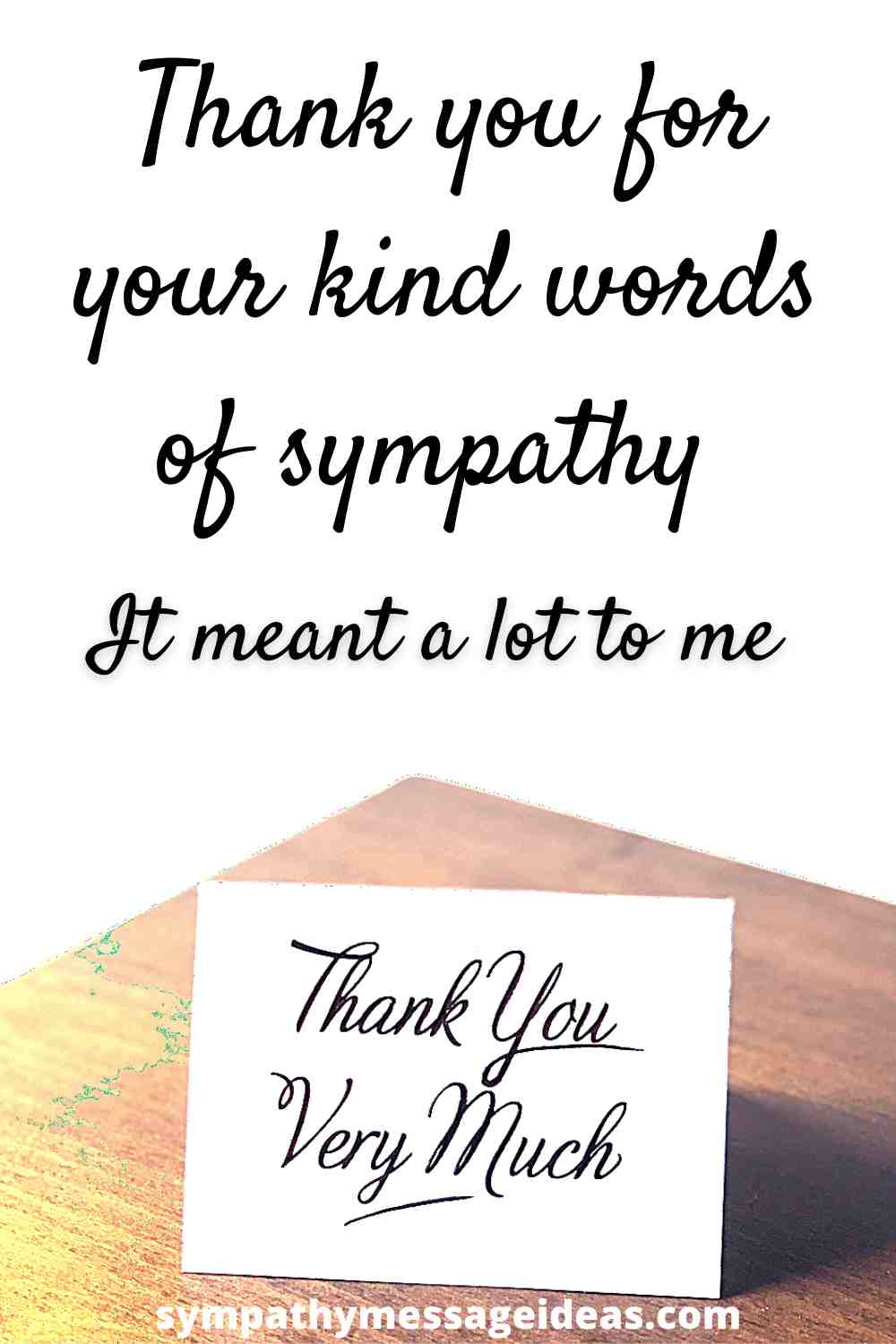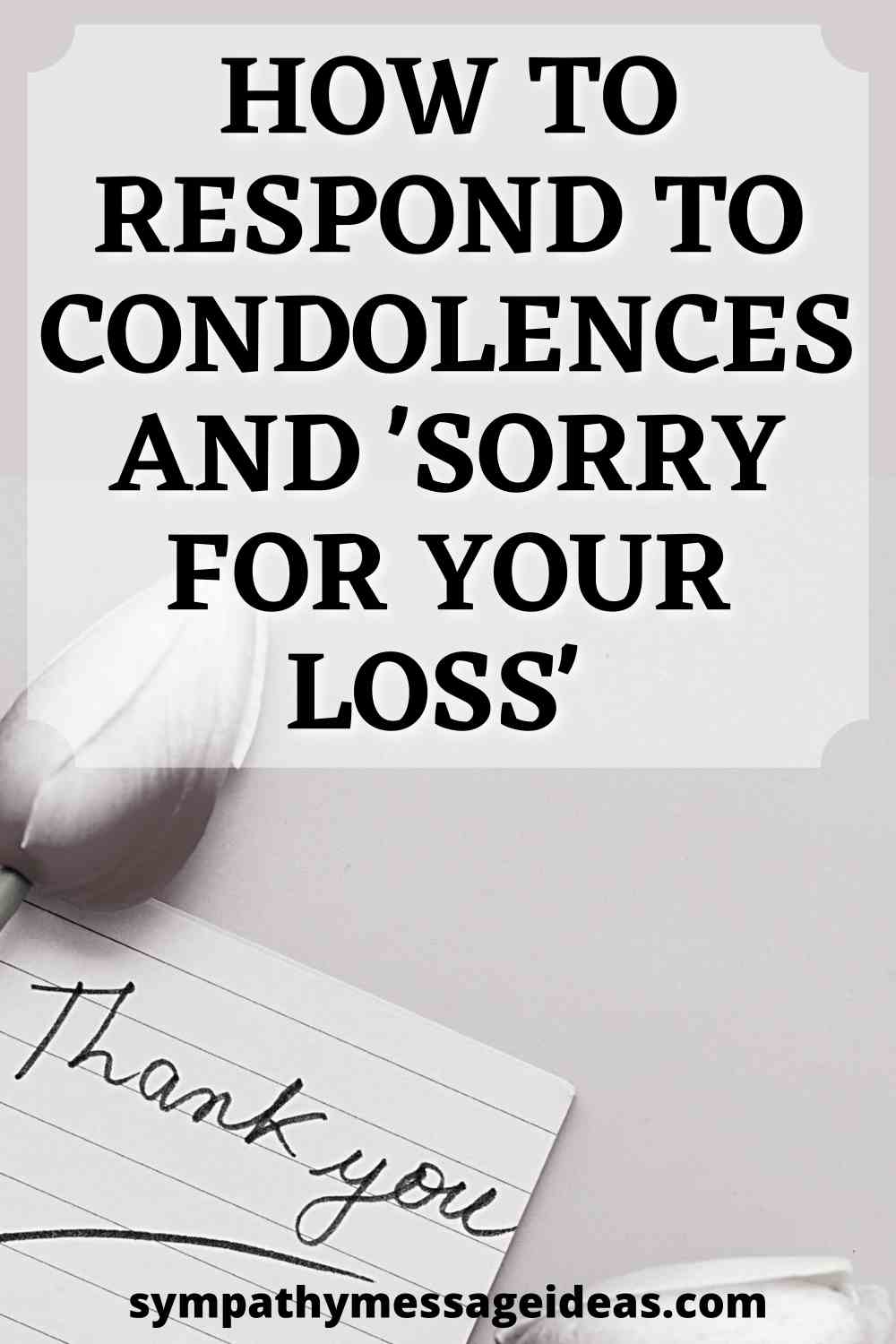Knowing how to respond to condolences people have sent or offered can be difficult. Coming soon after losing someone means the pain will still be raw and the grief at it’s most powerful.
Which makes coming up with a response much tougher. Trying to decide what to say or write to acknowledge sympathy messages and show your appreciation probably sounds quite daunting.
Even more so when you have to do so whilst dealing with a recent bereavement.
In a time of such suffering how do you respond to ‘sorry for your loss’ or other fairly benign condolence messages?
Well hopefully this simple to follow guide and the tips provided here will take away some of the stress and help you with how to reply.
How to Respond to Condolences?
The most simple way to reply to condolences or someone saying “sorry for your loss” is with a few words of thanks. Try these quick and short thank you messages for condolences:
- Thank you for thinking of me. I really appreciated your kind words
- Your support has been invaluable during this difficult time. I am so grateful
- Knowing friends were thinking of me was a real help when I was feeling low. Thank you all
- We appreciate all the thoughts and prayers we have received. Thank you
- Thank you to everyone who sent messages of sympathy. We were touched by the outpouring of support
- Your kindness during such a time of pain didn’t go unnoticed. We appreciate it enormously
- Thank you for your love and sympathy
- I am very grateful for your prayers and thoughts
Those are just some very straightforward examples of what you could say. But depending on who you are replying or offering your thanks to what you say will change.
For specific wording ideas for responding in person, via email, with a card and even on Facebook keep reading.
How to Respond to ‘I’m Sorry for your Loss’?
Generally, when someone has passed away and people say I’m sorry for your loss, there are a few ways to respond:
- Thank them for their message
- Express your appreciation
- Explain why you cannot at the moment
- Do nothing
Most people will choose to send a quick thank you message. It doesn’t need to be more than a few words.
The recipient won’t be expecting anything more than a simple “thank you” and will understand how hard it is for you during such a terrible time.
Perhaps when you’re feeling a little better or have come to terms with your loss somewhat you can go a bit further than that. Express your gratitude for their message or support.
It needn’t be anything too wordy but perhaps a few more words than a standard thank you. This could be in the form of a thank you card.
Some people may choose to send a very short message explaining why they don’t feel up to replying to condolences properly at that time. That’s perfectly acceptable (and discussed in the etiquette of responding to condolences further down)
And many of those grieving just won’t feel ready to speak to anyone, full stop. They may want to be left alone completely, in which no response is acceptable as well.
How to Respond to Condolences in Person?
After you’ve lost someone there will come a point where you will come face to face with people who will offer their condolences.
You might feel uncomfortable having to deal with and be expected to reply to their words of sympathy, however well meaning it is.
You shouldn’t feel guilty though. It’s understandable to want to avoid too much small talk or being reminded of your loss.
Grief takes a long time before it begins to pass. So whilst your still going through that process it can be extremely difficult to talk about the person you have lost.
But if you would like to say something then try the examples below of how to reply in person and choose a few to learn so that you’re prepared when meeting someone face to face.
- Thank you for your message of sympathy and your ongoing support. We are very grateful
- We appreciate you making the effort to be with us today. [deceased’s name] would have wanted you here
- I was so touched by all the help and support you’ve shown. I won’t forget it
- Having the love and support of friends like you has made getting through such a difficult time more bearable. Thank you
- Thank you for the kindness when I needed it most
- The flowers you sent were beautiful and I appreciated the gesture. It really brightened my day
- Your generous donation and condolences were a huge help when I needed it most. Thank you for thinking of me
- We were so touched by your sympathy, understanding and all the help you’ve offered. It has been such a relief to have you by our side
How to Respond to Condolences on Facebook
You may find people <reach out with their condolences by posting on Facebook. If so then this might be easier to reply to than in person.
A simple message of thanks to whoever has sent/posted some kind words of sympathy is fairly quick and simple.
You could also post an update that thanks everyone who has offered their condolences, meaning you don’t have to respond to each one individually.
This can save time and energy when you’re already feeling drained from grieving your loss.
Use these responses for a guide of the sort of things to say:
- Thank you for your message of support. I really appreciate it
- Thanks to everyone for the lovely messages of support. It means the world to me knowing all my friends are there if I need them
- The support of those closet to us has really been a help in getting through such a tough time. Your messages were a big part of that and we are very grateful for your kind words
- Thank you your lovely messages of sympathy. My whole family appreciates it so much
- Seeing such an outpouring of support on Facebook has helped lift my mood on a day when I was really feeling down. Thank you all
- Your kind words didn’t go unnoticed. Thank you, seeing all the messages is such a comfort
Responding to Condolences via Email
Replying to condolences you’ve received, be it from a card, message or email itself, can be time consuming.
Responding with an email is a good way to speed up the process. You can send a very similar email, maybe using a template, to every person who has contacted you.
This will make the process a lot simpler and faster but still let those kind enough to have sent their condolences know you really appreciated it.
Try these thank you email examples you can customize for your own circumstances:
Dear _______,
Thank you for your email and lovely words. It has been so comforting to have friends reach out to show they are there for me if I need them. I am coping ok and whilst not ready yet I look forward to seeing you in the near future.
All my love,
_______
***********************
Dear _______,
Your flowers and card were a beautiful gesture and I can’t tell you how much I appreciated them. I am grateful for all the love and support you and others have shown. It’s amazing to see how much my friends care, and that I have them to rely on when times are tough.
Kind regards,
_______
***********************
How to Respond to Condolences from your Boss
When your boss sends you a message of condolence it can be hard to know how to reply. But even though you might see your boss as someone important, respected and possibly even superior to your self, they are still like everyone else.
They are just another person feeling sorry for your loss and wanting you to know they’re thinking of you.
So how you respond to them needn’t be any different to anybody else.
SEE MORE: Condolence Messages for Boss
Sending a Thank You Card for Condolences
Responding to condolences with a thank you card is another good way to show your appreciation. You can find thank you cards that come with prewritten notes/messages but if you’d prefer to write your own here are a few ideas and templates of messages you can use:
Dear _______,
I appreciated your kind words at such a difficult time. It means a lot to know that friends are there for support when I need them most.
Sincerely,
_______
***********************
Dear _______,
We are so grateful for all the help and support you’ve shown both with the funeral and wake. It has been such a blessing to have you with us at such a difficult time.
With love,
_______
***********************
Dear _______,
I’m sorry this is late but I hope you can understand. Your prayers and comforting words were greatly appreciated and I hope we will see each other see under better circumstances.
Kind regards,
_______
***********************
Dear _______,
Thank you so much for your card and flowers, they really cheered me up. It’s been a real help to know I have friends thinking of and there for me.
Yours sincerely,
_______
***********************
Etiquette for Responding to Condolences
There are a few things you should remember when responding to condolences:
- Some people do more than just offer their condolences. They may have sent money or a donation, provided help when you needed it with chores or at the funeral, cooked food for you etc. If so then make sure to mention and thank them for that specifically in your response
- It’s better to send a card or note of thanks even if it’s late. People will understand you forgetting or not feeling ready so you shouldn’t feel embarrassed or put off from sending one even if it’s a later than you would have liked
- Writing your thank you note or card by hand isn’t necessary but it is a nice touch. If you can do it and it isn’t too much hassle then it will certainly be appreciated
- Not replying or responding is acceptable. Coping with a loss can be overwhelming so don’t feel pressured into quickly replying to every message you get. If you just don’t feel ready or capable then don’t. Everyone will understand and not judge you if that is the case
Conclusion
When dealing with bereavement it can be so hard to even function normally. So having to find the time and words to respond to condolences from well meaning people is often stressful and very difficult.
But you shouldn’t feel pressured to do so. Everyone will understand if you feel you can’t.
Hopefully the examples and tips provided here will have helped if you have decided to reply to express your gratitude abs thanks in the best way possible.



